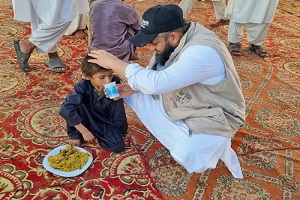Neelam Rahim | neelam@radioislam.co.za
4 min read | 17:02 CAT

The Jamiatul Ulama humanitarian team is currently in Pakistan on the ground and has been there for the past few days, primarily working in the Sindh area in different parts.
Speaking to Radio Islam International, Moulana Asad Pandor from the Jamiatul Ulama South Africa humanitarian team updated the dire situation. Having been there for the past four days, Moulana Pandor said the need on the ground is still dire. The water has not receded in many places.
“Traveling far distances to many places by boat and car, the situation does not seem to be getting better any times soon,” he says.
Also joining the crossover with Radio Islam, Moulana Mohamed Viad, who is part of the JUSA humanitarian team, describes the situation as excessively bleeding.
Moulana Viad described the farms and villages as now turned into a lake on an ocean with water reaching the knee and chest height.
He says, “This results in many other difficulties that come about. People have fled their homes, villages and have gone to higher ground, including camping along the road side with the little belongings they were able to salvage.”
Regarding getting the aid across, Moulana Pandor said it is very long hours of driving from Karachi. On an ordinary day, six hours of driving going and six hours of coming back.
He added their implementing partner on the Pakistan side has a network of Madaris they work from. Most of the relief items are kept at the Madaris; from there, they are loaded onto trucks and boats. After that, they head out searching for victims stranded on pieces of land.
Regarding the provision of immediate needs, Moulana Viad informs that it includes food rations like cooked meals and food hampers. Tented camps have been put in certain areas for families to house. There is an escalation as far as water diseases are concerned, as the water is stagnating.
The loss occurred on such a large scale that it cannot be described—the physical loss of homes, lives and livestock. As for the continuous ongoing economy, Moulana Viad said the entire harvest of cotton and vegetation has all been destroyed.
The next harvest that needs to be planted is that of wheat. If the water does not recede in the next week or two, it will be challenging to grow the grain, resulting in long-term implications for these areas and families.
Listen to the interview on Radio Islam’s podcast below.







0 Comments